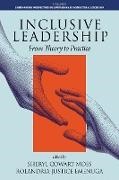Mehr lesen
Inclusive leaders create strong cultures with systems to respond to unique needs and encourage hidden potential. Inclusive leaders think in terms of each rather than all, and they strive to engage each child and adult. This perspective values individual cultural capital. (Cowart Moss, 2020; DeMatthews, 2018; McLeskey, Waldron, & Redd, 2019). Inclusive leadership requires district and school leaders to be intentional, hypervigilant, and to contextualize their work. These actions must be ongoing. They are not accomplishments, rather they must be a way of leading and seeing the world. (Berry, Cowart Moss & Gore, 2018; Mette, 2019). Leaders can break down barriers or create obstacles. Ironically, leaders may perceive themselves as promoting inclusion while still operating within areas of implicit bias (Arnold, 2019; Theoharis & Causton-Theoharis, 2008; Willey & Magee, 2018). Barriers to inclusion may reside outside of a leader's direct control. They may be systemic, or they may arise in unforeseen and unpredictable crises, like the COVID-19 pandemic. While our schools continue to face enormous challenges from COVID-19, they also face stress from increasing awareness and reactions to systemic racism and political polarization. History shows collaboration and strong relationships can greatly impact responses to a crisis and the quality of rebuilding efforts after a crisis. (Stern, Cetron, & Markel 2009). It is increasingly important for school leaders to cultivate inclusive approaches, building repertoires of skills to meet the needs of the diverse, marginalized, and unsettled members of their school communities. Leaders must have theoretical and pedagogical tools for assessing their capacities and for reflecting on their progress. They must have access to resources and support for continued growth. The ideal of inclusion is synonymous with belonging and caring, but ideals must be more than talking points. Inclusive leaders can parse out the subtleties that separate more abstract notions of justice and caring (Noddings, 2015) from specific actions that result in inclusive cultures. These leaders bridge the gap between theory and practice. This volume, Inclusive Leadership: From Theory to Practice, seeks to provide a more nuanced view of what it means to be an inclusive leader as it explores current research, practical applications, and personal narratives.

